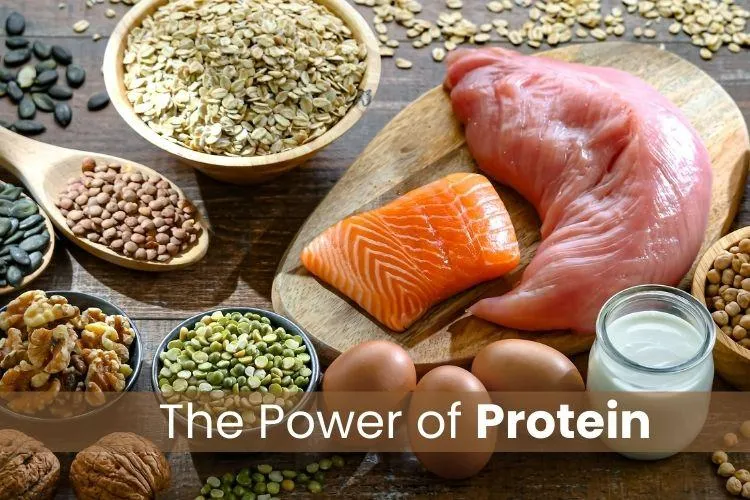
The Power of Protein
Protein is critical to life. The word protein, derived from the Greek word proteos, means primary. Proteins are large, complex molecules made up of small units called amino acids that are attached to each other to create large chains. It is the sequencing of these twenty different amino acids that determines their unique, three-dimensional structures and specific functions.
Enzymes contain the proteins needed for catalyzing thousands of biochemical reactions that take place within your cells and outside of your cells that are essential to metabolism, digestion, energy production, blood clotting, muscle contraction, growth, and repair. If you lack these enzymes or if they function improperly, it can result in disease.
Under normal circumstances, your body breaks down the same amount of protein that it uses to build and repair tissues. Proteins are in a constant state of turnover. At times, your body breaks down more protein than it can create, such as in states of illness, injury, surgery, pregnancy, breastfeeding, aging, athletics, and weight loss, thus increasing your body’s needs.
Types of Proteins and Their Functions
Hormones, made and secreted by endocrine tissues or glands, contain proteins that act as messengers for communication between your cells, tissues, and organs. They are transported in your blood to their target tissues, where they bind to protein receptors on the cell’s surface. Protein-based hormones include insulin, glucagon, adrenal hormone, human growth hormone, and steroids (essential for life), as well as testosterone and estrogen (sex hormones) and tryptophan or tyrosine (amines that are related to sleep and metabolism).
Three types of proteins—keratin, elastin, and collagen—are absolutely essential for the growth, repair, and maintenance of tissues and structure. Keratin is a fibrous protein that provides cells and tissues with the stiffness and rigidity that are essential to skin, hair, and nails. Elastin is essential for the flexibility of tissues, including the uterus, lungs, and arteries. Collagen is essential for your bones, tendons, ligaments, and skin.
Protein also plays a vital role in regulating pH, the acid-base balance in your blood and other bodily fluids. Even a slight imbalance in pH can be harmful or potentially deadly. Protein buffering systems that maintain normal pH ranges include phosphate, bicarbonate, and hemoglobin, the protein that makes up red blood cells. Proteins, such as albumin and globulin in our bloodstream, regulate fluid balance by attracting and retaining water. If you don’t eat enough protein, these levels decrease, and these proteins can no longer keep blood in your blood vessels. The fluid is forced into the spaces between your cells. As it continues to build up, swelling occurs, particularly in the belly region and legs.
Immunoglobulins and antibodies are proteins essential for immune function. A deficiency in protein leads to a higher risk of infections. Proteins are also essential for transport, acting as carriers for vitamins, minerals, sugars, cholesterol, and even oxygen (in the form of hemoglobin). Ferritin, a protein that stores iron, is an example of a protein that acts as a critical storage unit in the body.
Protein Is Energy
Protein contains four calories per gram. Carbohydrates also contain four calories per gram, and fats supply the most energy at nine calories per gram. Carbohydrates and fats are better suited for providing initial energy, as your body maintains reserves of sugar and fat for fuel. Although your body can store carbohydrates and fats, it doesn’t store protein the same way because it is constantly breaking down and rebuilding new protein. This is why it is essential to consume protein continuously through nutritional sources.
Studies suggest that, at minimum, you aim for thirty grams of protein per meal—ninety grams per day—to maintain muscle mass. The old recommended daily allowance of 0.8 grams of protein per kilogram of body weight (approximately sixty grams per day) is conservative, and the research is outdated. The newer recommendation for optimal health is ninety to one hundred grams per day. When exercising, your body requires more protein: 150 grams per day (1.4 to 2.0 g/kg of body weight). When in a calorie deficit for weight loss and exercising, the body may need as much as 170 to 200 grams per day (2.3 to 3.1 g/kg) to maintain muscle mass. Protein requirements vary with age, sex, weight, activity level, and goals.
Protein timing also depends on your goals. Always eat protein first, especially before starches. Protein increases the production of PYY, a gut hormone that makes you feel full and satisfied, and decreases the level of ghrelin, the "hunger hormone." Eating protein first can also help keep your blood sugar and insulin from rising too high after a meal. Recent research suggests that distributing protein throughout the day will maximize muscle growth. For aggressive muscle building, breakfast—the first meal of the day after the nighttime fat-burning fast—is critical. Because the kidneys can handle only 40 to 50 grams of protein per sitting, splitting protein throughout the day is vital if the goal is bodybuilding. For weight loss and maintaining muscle mass, however, fasting between meals will force the body to use fat as fuel. Distribute the protein throughout the day in two to three meals rather than saving it all for dinner.
Not all protein is created equal. Protein from animal sources contains all the essential amino acids that humans need to build and maintain muscle. Plant proteins often do not and are therefore labeled "incomplete proteins." Essential for stimulating muscle protein synthesis is the amino acid leucine. Research shows that 2.5 to 3 grams of leucine is needed to stimulate muscle growth. Animal proteins require half the volume compared to plant proteins to reach this leucine threshold. Whey protein supplements contain almost twice the amount of leucine compared to soy, and plant protein contains even less. However, plant proteins provide more fiber and phytochemical antioxidants that benefit gut health and help protect cells from outside stressors, reducing the risk of disease.
